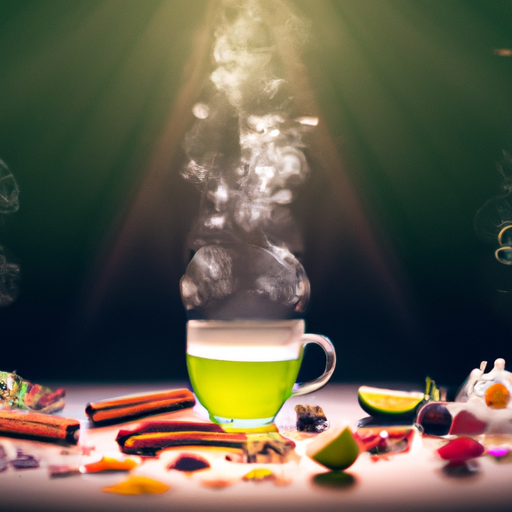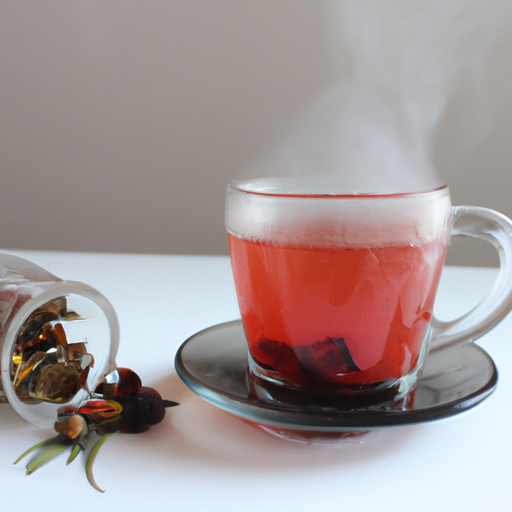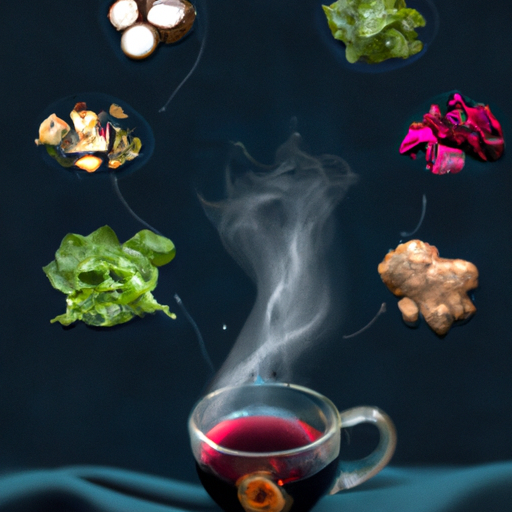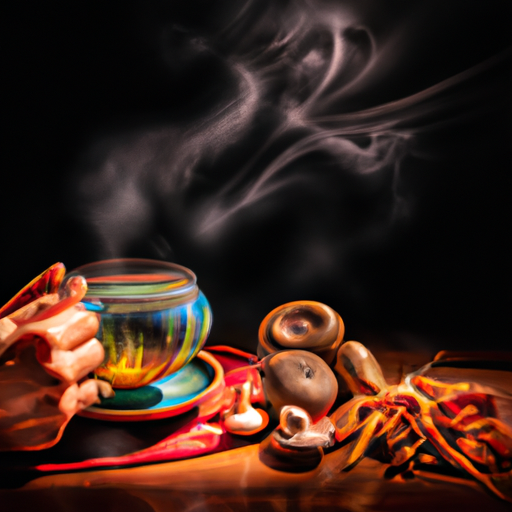As a tea enthusiast, I constantly find myself seeking new ways to enhance my herbal tea experience. From the soothing aroma to the calming effects, herbal tea has become my go-to beverage for relaxation and rejuvenation.
But have you ever wondered what else you can add to your herbal tea to elevate its flavors and health benefits? Look no further! In this article, I will share with you a variety of delightful additions that will take your herbal tea to the next level.
Whether it’s the zesty burst of citrus fruits, the aromatic touch of fresh herbs, or the warm spice of cinnamon, the possibilities are endless. Not only will these additions tantalize your taste buds, but they also bring a host of additional health benefits.
So grab your favorite herbal tea blend and let’s embark on a journey of exploration and enjoyment together. Get ready to sip on a cup of herbal tea infused with nature’s finest ingredients!
Key Takeaways
- Adding citrus fruits like lemon or orange provides flavor and vitamin C.
- Fresh herbs like chamomile, peppermint, lemon balm, lavender, and rosemary add aroma and medicinal properties.
- Spices like cinnamon, ginger, and cardamom add warmth, depth, and potential health benefits.
- Edible flowers such as lavender, chamomile, and rose petals can be steeped in hot water with herbal tea leaves to infuse their flavors, offering taste enhancement and potential health benefits.
Citrus fruits
You can add a squeeze of fresh lemon or a splash of tangy orange juice to your herbal tea for a burst of citrusy goodness that’ll make your taste buds dance! Citrus fruits not only enhance the flavor of your tea but also provide numerous health benefits.
They’re packed with vitamin C, which boosts your immune system and helps fight off colds and flu. Citrus fruits also contain antioxidants that help protect your cells from damage and reduce the risk of chronic diseases like heart disease and cancer.
There are different ways to incorporate citrus fruits into your herbal tea blends. One simple way is to add a few slices of lemon or orange to your tea while it’s steeping. This allows the flavors to infuse into the tea, giving it a refreshing citrus twist. Another option is to zest the skin of the citrus fruits and add it directly to your tea for a more intense flavor. You can also squeeze the juice of the fruits into your tea for a tangy kick.
Now, let’s move on to the next section about fresh herbs, which can further enhance the taste and health benefits of your herbal tea.
Fresh herbs
To enhance the flavor of your brew, consider incorporating some freshly picked herbs. Not only do they add a delightful aroma and taste to your herbal tea, but they also bring along their own set of medicinal properties. Growing and harvesting fresh herbs for herbal tea is a rewarding experience that allows you to have a constant supply of these beneficial plants.
Here are five reasons why adding fresh herbs to your herbal tea can be beneficial:
- Chamomile: Known for its calming properties, chamomile can help soothe anxiety and promote better sleep.
- Peppermint: With its refreshing and cooling flavor, peppermint can aid digestion and relieve stomach discomfort.
- Lemon balm: This herb has a citrusy aroma and can help reduce stress and improve mood.
- Lavender: Known for its relaxing properties, lavender can help alleviate headaches and promote relaxation.
- Rosemary: With its distinct pine-like flavor, rosemary is known to improve memory and concentration.
Growing and harvesting these herbs is relatively easy and can be done in your backyard or even in pots indoors. Just make sure to provide them with enough sunlight and water.
Now, let’s move on to the next step and explore the world of spices for your herbal tea.
Spices
If you want to infuse your brew with an explosion of warmth and depth, spices are the secret ingredient that’ll transport your taste buds to a world of aromatic bliss. Adding spices to herbal tea not only enhances its flavor but also brings a plethora of health benefits.
Spices like cinnamon, ginger, and cardamom are popular choices for herbal tea enthusiasts. Cinnamon, with its sweet and woody flavor, adds a comforting touch to any herbal tea blend. It’s known for its anti-inflammatory properties and may help regulate blood sugar levels. Ginger, on the other hand, adds a spicy kick and is renowned for its soothing effects on the digestive system. It can relieve nausea and aid digestion. Cardamom, with its warm and slightly citrusy taste, adds a touch of exoticness to herbal tea. It’s believed to have antioxidant properties and may help improve digestive health.
Incorporating spices into your herbal tea not only adds complexity to the flavor profile but also provides potential health benefits. So, why not experiment with different spices in your next cup of herbal tea and discover a whole new world of taste and wellness?
Transitioning into the subsequent section about ‘honey or agave syrup,’ adding a touch of sweetness can further enhance the flavors of your herbal tea.
Honey or agave syrup
Indulge in the golden sweetness of honey or the smooth nectar of agave syrup, and let nature’s delectable elixirs gracefully swirl into your warm, infused cup. When it comes to adding a touch of sweetness to herbal tea, honey and agave syrup are two popular options. Not only do they enhance the flavor of the tea, but they also bring along their own set of health benefits.
Honey has been used for centuries as a natural sweetener and remedy for various ailments. It is packed with antioxidants, enzymes, and minerals that can boost your immune system and soothe a sore throat. Agave syrup, on the other hand, is derived from the agave plant and has a lower glycemic index compared to honey. This makes it a suitable choice for those watching their blood sugar levels.
To help you better understand the benefits of honey and agave syrup, take a look at the table below:
| Sweetener | Health Benefits |
|---|---|
| Honey | Boosts immunity, soothes sore throat |
| Agave Syrup | Lower glycemic index, suitable for diabetics |
Adding honey or agave syrup to your herbal tea not only adds sweetness but also provides valuable nutrients. As we move on to the next section about fruit juice, let’s explore how this fruity addition can elevate your tea-drinking experience.
Fruit juice
Savor the vibrant burst of flavor as you pour in a splash of refreshing fruit juice into your warm, infused cup. Adding fruit juice to herbal tea not only enhances its taste but also provides additional health benefits. You can experiment with different types of fruit juices such as orange, apple, or cranberry to find your favorite combination. Alternatively, you can try using fruit puree for a more intense flavor profile. Fruit puree adds a thicker consistency and can be easily incorporated into your tea.
In addition to the taste, fruit juice brings a multitude of vitamins, minerals, and antioxidants to your cup. These nutrients help boost your immune system, improve digestion, and provide a natural source of energy. Some fruits, like citrus fruits, are high in vitamin C, which is known for its immune-boosting properties.
Infused oils can also be a delightful addition to your herbal tea. These oils are made by infusing herbs or fruits in a carrier oil, such as olive or coconut oil. The resulting oil can then be added to your tea for a unique flavor experience. Infused oils can be found in specialty stores or made at home using dried herbs or fruits.
Transitioning into the subsequent section about coconut milk, you can also explore adding a creamy touch to your herbal tea by incorporating coconut milk.
Coconut milk
When it comes to adding a twist to your herbal tea, fruit juice is a popular choice. However, if you’re looking for something different, you might consider adding coconut milk instead. Not only does it add a creamy texture and a subtle tropical flavor to your tea, but it also offers numerous health benefits.
Coconut milk is known for its high content of medium-chain triglycerides (MCTs), which are a type of healthy fat that can provide a quick source of energy. Additionally, it contains essential vitamins and minerals such as potassium, magnesium, and vitamin C. These nutrients can help support your immune system, promote healthy digestion, and contribute to overall well-being.
There are many delicious recipes that incorporate coconut milk into herbal tea. One simple option is to mix coconut milk with chamomile tea for a soothing and relaxing drink. For a refreshing twist, you can add coconut milk to mint tea and garnish with fresh mint leaves. Another popular combination is coconut milk with lemongrass tea, creating a tropical and invigorating beverage.
Now that we’ve explored the benefits and recipes using coconut milk in herbal tea, let’s move on to another exciting addition: edible flowers.
Edible flowers
Edible flowers offer a unique and visually appealing touch to your beverage, elevating both its taste and presentation. When it comes to herbal tea, incorporating edible flowers can take your drink to a whole new level. Not only do these flowers add a pop of vibrant color, but they also bring a range of culinary uses and health benefits.
In terms of culinary uses, edible flowers can be used in various ways. They can be steeped in hot water along with the herbal tea leaves to infuse their delicate flavors. Some popular choices include lavender, chamomile, and rose petals, which add a subtle floral note to the tea. Edible flowers can also be used as garnishes, adding an aesthetic appeal to your cup of tea.
Aside from their culinary uses, incorporating edible flowers into herbal tea also offers health benefits. Many flowers contain antioxidants and phytonutrients, which can help boost the immune system and protect against diseases. For example, chamomile flowers have calming properties and can help with relaxation and sleep. Calendula flowers are known for their anti-inflammatory properties, while rose petals have been traditionally used to soothe digestion.
Adding edible flowers to your herbal tea not only enhances its taste and presentation but also provides various culinary uses and health benefits. So go ahead and experiment with different edible flowers to create a visually stunning and nourishing cup of tea.
Frequently Asked Questions
How do I properly store fresh herbs to keep them fresh for longer?
To properly store fresh herbs and extend their shelf life, keep them dry by removing any moisture and storing them in an airtight container in the refrigerator. This prevents spoilage and ensures their freshness for longer.
Can I use dried spices instead of fresh ones in herbal tea?
Yes, you can use dried spices instead of fresh ones in herbal tea. In fact, studies show that dried spices retain their flavor and potency, making them a convenient and effective substitute for fresh herbs in tea.
Is it safe to add fruit juice to herbal tea if I have certain health conditions or dietary restrictions?
Adding fruit juice to herbal tea may not be safe for individuals with certain health conditions or dietary restrictions. It can potentially interact with medications and affect blood sugar levels. It’s important to consult with a healthcare professional before making any changes to your diet.
What are some alternative sweeteners I can use instead of honey or agave syrup?
Some alternative sweeteners for herbal tea include stevia, monk fruit extract, and xylitol. To enhance the flavor of herbal tea without sweeteners, try adding citrus zest, fresh herbs, or a splash of lemon juice.
Are there any specific edible flowers that should be avoided when adding them to herbal tea?
There are a few edible flowers that should be avoided when adding them to herbal tea. Some examples include daffodils, foxglove, and lily of the valley, as they can be toxic if consumed. To brew the perfect cup of herbal tea, consider steeping it for 5-7 minutes and using water that is just below boiling temperature.
Conclusion
So there you have it, the possibilities for enhancing your herbal tea are endless! You can add citrus fruits like lemon or orange to bring a zesty freshness to your cup. You can also add fresh herbs like mint or basil for a delightful aroma and flavor. Spices like cinnamon or ginger can provide a warm and comforting element. Sweeten your tea with a touch of honey or agave syrup for a natural sweetness. For a fruity twist, try adding a splash of fruit juice. And if you’re feeling adventurous, why not try a creamy twist with some coconut milk? Lastly, garnishing with edible flowers not only adds visual appeal but also imparts a subtle floral note. So go ahead, get creative and elevate your herbal tea experience!










